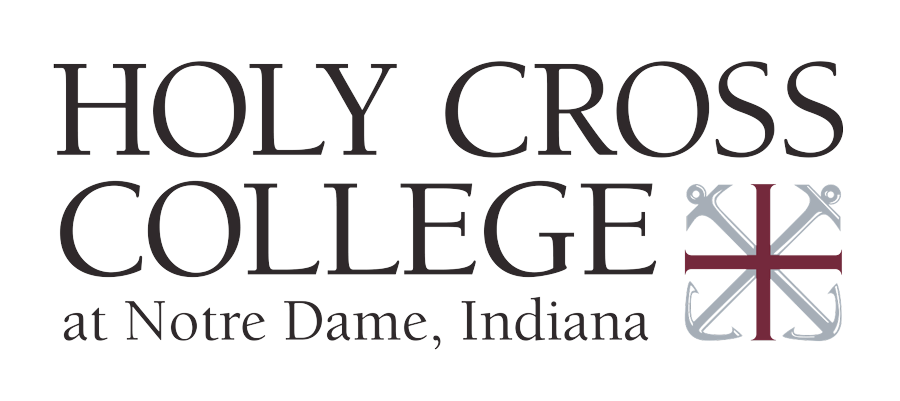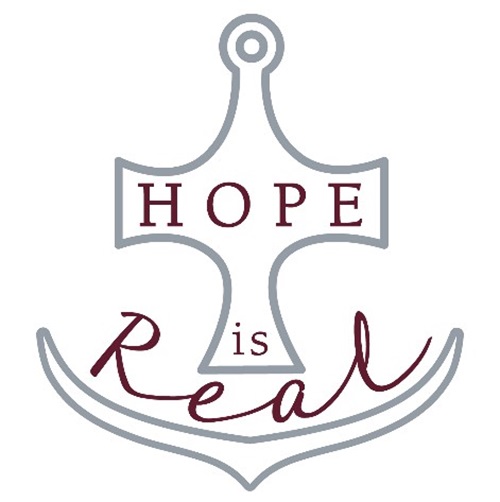
Ave Crux Spes Unica
“God did not spare his own Son but handed him over for us all; with him, he has given us all things.”
–Romans 8:32
We invite you to walk with us as we share our stories during this Lenten journey revealing how the Cross urges us to proclaim that “HOPE is Real”.
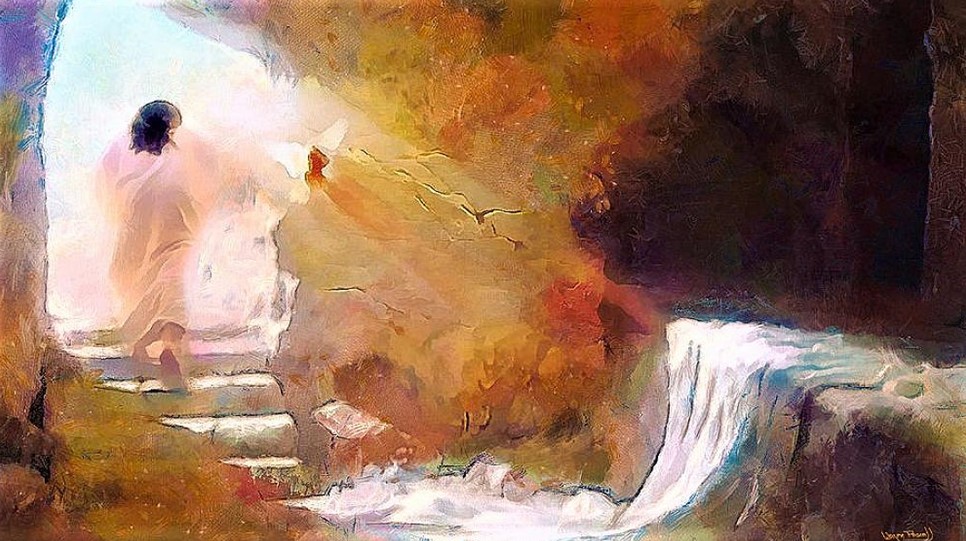
This Easter, I am blessed to share that hope is real and does not disappoint.
Blessed Basil Moreau taught us to look to the power of the cross as our hope: the power that promises Resurrection and New Life, saying we find hope in the cross because it reminds us that the Lord has overcome the world, sin, and death. Therefore, no suffering is beyond the reach of the redemption it brings. Believing that the Lord’s blessings come through the crosses we bear out of love, Moreau encourages us to live in a way that reflects the self-emptying love Jesus showed on the cross and to stand with others during times of trial as Our Lady of Sorrows stood by her Son.
My family was recently given the opportunity to live these realities and just experienced firsthand the power and promise found in Christ’s Cross about which Moreau wrote!
This past December we were shocked to learn one of my brothers was diagnosed with prostate cancer that metastasized to the spine. From the onset of his diagnosis, my brother set the tone for our wider family’s response – accepting his cross and thanking God for the opportunity to suffer, with an eye toward what the Lord wanted to teach him in this chapter of his life. The family response was to lean into the Lord, pleading for my brother’s healing, all the while trusting in God whatever the outcome might be. And so, we united in prayer, sacrifice, fasting, and joined together in a novena to Our Lady of Sorrows. And we are grateful for the many additional prayers, Masses, healing services, sacrifices, and support that came flooding in from around the world.
My brother began intravenous chemo treatments on January 19 with a PSA level at 261 (normal is 4). Having a rare and serious reaction to his first chemo treatment, he ended up in the hospital for nearly a month with more than half of that time in the IUC, twice fighting for his life. Resurrection came on March 18 as the doctors shared that there was a dramatic decrease in my brother’s PSA levels which dropped to 19.7, and his doctors expect his PSA levels to continue to drop. With new and upcoming research, continued medical care, support from family and friends, and especially Heaven’s help, he could stay in remission for years to come.
While we are all thankful for the gift of modern medicine and the expertise his medical team provided, six chemotherapy treatments were originally planned but only one was needed. We know other factors are involved. As my brother recently wrote to our family, “I am convinced I would not be where I am today without all the prayers and sacrifices and healing services and Masses, and corporal works of mercy provided me.”
Ave Crux, Spes Unica!
Thank you, Jesus, for the power of the Cross.
Carolyn Kitz
Director of Student Activities
On Ash Wednesday, God’s people called out of the world to be a sign to and instrument of God’s love for the life of the world, embarked on the journey into the Lenten Season. As ashes were pressed on our foreheads, we heard words that reminded us of our being created and of our mortality as well as our need to turn to the God who saves us:
“Remember that you are from dust, and to dust you shall return.”
and
“Repent and believe in the gospel.”
Now, in the midst of the Holy Triduum, we are drawn into the Passion of Our Lord, Who, as the Prophet Isaiah says,
“was cut off from the land of the living,
and smitten for the sin of his people,
a grave was assigned him among the wicked
and a burial place with evildoers.”
Death, graves, sin, repentance, and salvation are topics that the worldly culture that surrounds gives little meaningful thought to, often because it doesn’t know what to do with what these words ask us to ponder. Years ago, I was a hospice chaplain and painfully and regularly witnessed this firsthand. I’ve also lived in places where we dug the graves of those we were burying, which revealed much to me about places where we let others use machines bury our dead.
It is not surprising that ours is also a context that has a troubled relationship with the challenging theological virtue of hope, which – if spoken of at all – tends to be alluded to in vague or enigmatic ways, often reduced to a naïve optimism or some sort of secular concept. This presents a challenging soil for the reality seeded in our lives by God’s Church on Good Friday – the day above all others when Christians call to mind our longing and desire for the kingdom of heaven and eternal life as our happiness and the hard truth that we cannot save ourselves (Catechism of the Catholic Church, #1817).
At our college we often utter the words: Ave Crux Spes Unica – “Hail the Cross, Our Only Hope.” This language speaks volumes about that which the world around us so often falters, flails, and fails. Our God, the origin and object of our hope, has come to us, become one of us and makes a way, revealing to us a Love that is stronger than death and the grave (Song of Songs, 8:6). Our God infuses hope in us to draw us, over the course of our lives together, into communion. Though we can’t save ourselves, practicing the hope found in the Cross of Christ Jesus, means that, as friends of the Risen Jesus, we will be summoned and stretched to share in His “work of resurrection” (Moreau) during our earthly sojourn until we are one in Eternity with the Crucified Love that is the God.
Shawn Storer, M.Div.
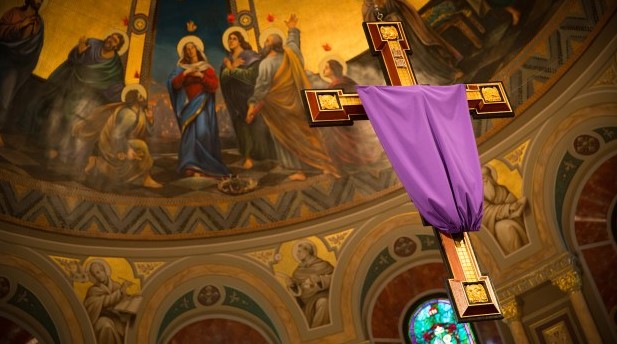
As we enter Holy Week, this sixth week of Lent is called Passion or Palm Sunday before the Paschal Triduum The statues we take for granted, of saints, the Sacred Heart, and the Crucifix will be veiled in purple cloth. But why?
Our statues are covered to remind us of what it would be like if we had no Passion and no Resurrection of Christ. Had He not died on the cross and rose from the grave, we would have no saints, no salvation, and no way to overcome death. These statues we constantly see tend to be overlooked and fade into the background of what is expected at a church. By covering them, we emphasize how good they are, it allows us to appreciate their beauty in a new way.
The cross itself will be unveiled on Good Friday, during the celebration of our Lord’s Passion. Those present will come forward to venerate it by offering a kiss. The other images of saints or Christ resurrected will stay veiled until the Easter Vigil, the culminating celebration of the Resurrection. The statues are unveiled during the vigil because the Resurrection brings them meaning. It not only opens the doors of heaven but allows the saints to live in glory.
During this Lenten season, Catholics are called to pick up their own crosses. While some have given up certain foods or pleasures, we are all called to remember Lent is not the end. These forty days provide a boot camp, if you will, of the lessons on fasting, praying and giving of alms that help us bear our loads with grace during any time of the year. It is an intensive training on how to sacrifice and walk with our own struggles as Christ did. While we know the end of the Easter story, Christ’s resurrection and overcoming of death, it can be difficult to remember this glory under our own crosses. Luckily, we can look to the cross and remember who walked before us. Just as Passiontide and Good Friday lead us to the Resurrection, we await with hope the unveiling of new life with Him in the world to come.
If you are not Catholic, or have fallen away from the faith, I invite you to step into St. Joseph’s Chapel sometime this week. Take the time to sit below a holy statue or under the gleam of a stained-glass window to say hi to God. Enter into this quiet space and just be. Consider the gifts you often take for granted and how you might show gratitude to those who brought such good to your life. Maybe even ask for help to carry a particular cross. The One who carried the biggest cross will still be waiting for you when Easter has come and gone. He who loved you into existence and invites us to share in His passion knows how to get you to the other side.
Mataya Watson, Class of ’27
Throughout the last couple years, one thing I have realized about myself is my habit of distrust. If that be distrust in social settings, people, or even in the Lord. This is not a common state for me. However, when I am faced with the unknown – I find myself unable to trust. Trust is hard to have when you are scared, or you are faced with a situation that you cannot control. Personally, I am someone who enjoys being in control, and I have a really hard time when outside factors interrupt my life. I hold a lot of fear in my heart, and in that fear, I suffer when things do not work out as I have planned them. Even having a positive mindset or hopeful attitude is difficult. Sometimes the want of hope is overshadowed by fear, and in this we find suffering. We suffer in that moment because we cannot see anything beyond what we are currently facing. It is hard to trust when we are faced with fear, but this is also when trust is needed most. During this Lenten season, we are meant to meet the Lord in our fear. When we are scared, suffering, or suffocating in distrust that is when the Lord is reaching out His arms to us the most. He wants to hold us in His arms and protect us from anything that we may be facing. He will be there waiting for us, even if we may turn our backs on Him out of fear. When we suffer, we participate in the mystery of Christ’s Passion. We meet Jesus directly at the foot of His Cross. The crucifixion is a constant reminder of why we should trust in the Lord. He suffered, died, and rose for our sins, so that in that we may be saved. His love for us is great that no suffering we ever face, self-inflicted or put on upon us by others, is ever unseen or unheard by Christ. In that, the Cross is a beacon of hope, especially throughout the Lenten season. Let the Cross be a reminder that suffering is our temporary, but Christ is our forever.
Ave Crux, Spes Unica!
Abbigayle Lemons
Class of 2024 (December)
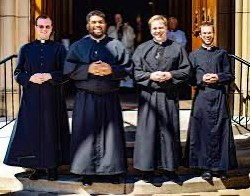
The cross was constantly before the eyes of Basil Moreau, whose motto for his congregation was Spes Unica. The cross was to be “Our Only Hope.” (Constitutions of the Congregation of Holy Cross, #8)
Blessed Basil Moreau was no stranger to the cross of Christ and the hope that it promises. It should be no surprise then that he chose “Ave Crux Spes Unica, Hail the Cross Our Only Hope” as the motto for his fledgling Holy Cross community. It is these seemingly paradoxical words, that still to this day, encompass the identity and spirituality of every single Holy Cross brother, sister, and priest throughout the world.
Each time we look upon the cross, we are reminded that it was through this ancient symbol of suffering and death, that the promise of salvation and eternal life came into the world. As Christians, we are called to share in Christ’s passion and resurrection. It is by taking up His cross and following in His footsteps, that we are led down the path which does not end, the path of eternal life. In this way we discover for ourselves how “even the cross can be borne as a gift”.
Br James Walters, CSC
Class of 2017
It was a rainy day in 2011, as I sat in my dad’s office having just finished an appointment with another medical specialist. This had become the regular routine in the weeks prior, as countless doctors were stumped by my declining health. The most recent specialist was an orthopedist, a doctor who specializes in bone health. The phone rang and my dad answered, the doctor was calling with my most recent test results. I will never forget the words I heard the doctor say in that moment. I had End Stage Renal disease and needed to go the hospital immediately. My kidneys were going into complete failure, and if left untreated could lead to eternal rest. As I reflect on this moment, I remember how calm I was for an 8-year-old being told this news. I recall telling my parents something to the effect of: “that God was in control, and He would protect me.” The courage I experienced in the face of something so devastating can only come from a place of hope and faith in the Cross.
When I reflect on all the challenges I’ve experienced, the one thing that has always gotten me through them is my faith in God. As St. Paul tells the Romans: “If God is for us, who can be against us?” (Romans 8:31). These encouraging words by St. Paul show that even when we are undergoing our daily struggles, we have nothing to fear for God is with us. Whenever I say the prayer: Ave Crux Spes Unica, I am reminded of the hope we have as Christians in the sacrifice of the Cross. This May will mark the 10th anniversary of when I received a kidney transplant from my brother and the 13th anniversary of when I started putting all my faith and hope in God and the Cross. May this Lenten season be a time of spiritual renewal for all of us in the Cross, “our only hope”.
Nicholas Surat, class of 2025
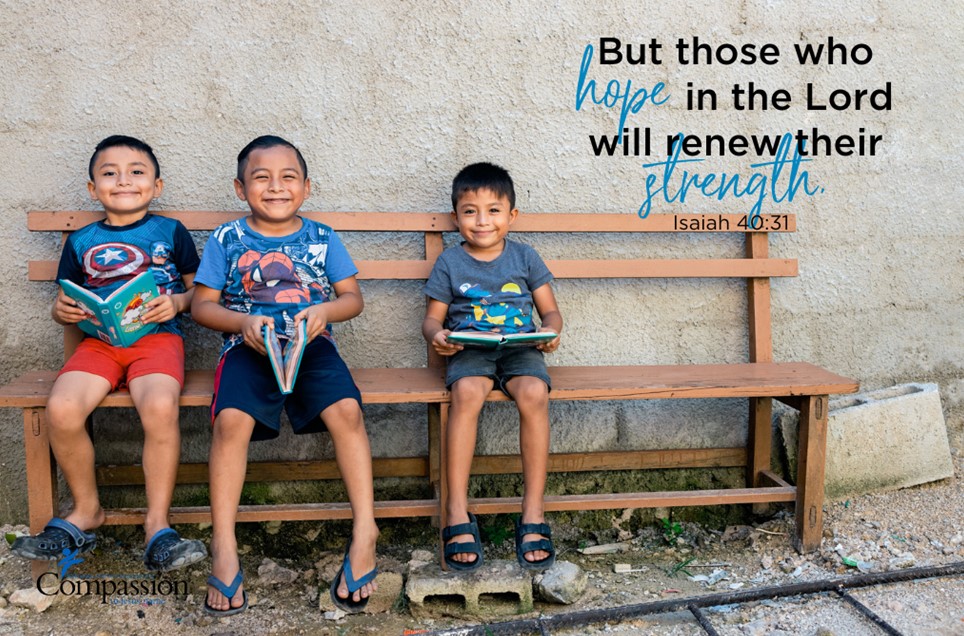
Hope and A Growth Mindset
I recall as a child, after having dealt with the disappointment of not making the final cut for the travel baseball team at the age of nine, my mother sat with me on the front steps of our home and uttered words that I cling to today: “Marc (she was one of two people who referred to me as Marc, not Marco), God has called you to something big and important in your life. This is only a minor setback. You will learn from it, get stronger, and be a better person from this hardship.” Sometimes when I hear people criticize hope as not being a good strategy, I often think to myself, but what’s the alternative?
My mom’s approach was a strategy to give me hope, to build me up and to give me something to look forward to. Following that season, I worked harder, got stronger, and made the team the next year, finishing the season as an All-Star selection. I never considered myself very good at baseball, but my mom taught me something valuable in life, way beyond baseball, that is with any hardship, setback, or even audacious goal setting, if we come from a place of hope and belief, we can overcome and stand a better chance to succeed. And even if we don’t succeed, we’re better off for having tried.
We are blessed at Holy Cross to have a leader in our Department of Social Sciences, Dr. Cosette Fox, who is widely considered to be among the top scholars in the world on the principle of growth mindset. Rooted in the teachings and research of psychologist Carol Dweck, Dweck discovered that people with a growth mindset believe that their abilities can be developed through dedication and hard work. On the contrary, individuals with a fixed mindset believe that their abilities are fixed traits and cannot be improved upon.
Dr. Fox, like Dr. Dweck, has been conducting research with her students on growth vs. fixed mindset. A year ago, a group of students accompanied her to her native country of Lebanon where the students conducted trainings and performed assessments on war-ravaged refugee children. This was an enormously impactful experience for these students. They listened to the horrific stories, conducted assessments, and provided students with some tools and training in growth mindset to give these refugee children hope for a brighter future. Through their research, Dr. Fox and her students posited that improving the hopefulness and perceived sense of control in adolescents following this participation holds a promising potential to enhance the mental health of this delicate student cohort, especially in times of crises and uncertainties.[1]
My leadership platform at Holy Cross lands squarely on the virtue of hope and the possibilities that lay ahead. What I learn from reading scripture and the lives of the Saints as well as research of scholars like Dweck, Fox, and our Holy Cross students, and from the practical applications taught to me by my mother, is that hope is a strategy after all. When we put our hope in God, He will raise us up and give us strength again. By putting our hope in God, we can continue the work and the plans that He has for us.
I believe that if we approach each day, each moment, and each interaction seeking to be a hope-filled and hopeful disciples, then we are fulfilling our call as as Christian disciples and doing our small part to make the world around us better. For indeed, hope is real.
Dr. Marco Clark
President, Holy Cross College
[1] Buchlmayer, Alexandra & Snyder, Lucas & Sotomayor, Ian & Smith, Arielle & Jans, Laura & Schleider, Jessica & El Khoury-Malhame, Myriam & Fox, Cosette. (2023). Effects of an Online Growth Mindset Single-Session Intervention on Hopelessness and Perception of Control in Arabic Adolescents. 10.31234/osf.io/9rz6y
“Ave Crux Spes Unica.” Hail the cross our only hope.
To hail something is to enthusiastically greet or acknowledge a thing’s presence. In reading this definition I feel a particular call to refocus my efforts this lent on hailing Christ’s cross, perhaps, at times, the temptation can be to rush to hope rather than sitting in the paradox of the cross. The act of crucifixion was the Romans most excellent form of torture. Jesus on his way to this torture was whipped, crowned with thorns, made to carry his own instrument of death, and made to be naked before all. Moreover, most of his friends abandoned him and allowed him to suffer alone. Jesus Christ was and is an innocent man. I, though, am not an innocent man. I am insistent on doing those things that defile my nature. I insist on sinning and killing the person God made me to be. I insist on separating myself from the innocent man on the Cross. I have victimized my God and I have nailed him to the cross, my sin is responsible for this grotesque death. And in the end what happened? Jesus, hung upon the cross, was pierced with a lance. The lance traveled through his side and into his heart. In this, Christ gave every drop of his blood for the earth. In the same way water poured from his side. Today when I walk into the chapel, I will dip my hand in the Holy Water and drink from the Chalice of His Blood. Blood and water poured from his side then and also today so that I might have life and have it to the full. Ave Crux Spes Unica!
Paul Gates, Class of 2026,
Old College Collegiate
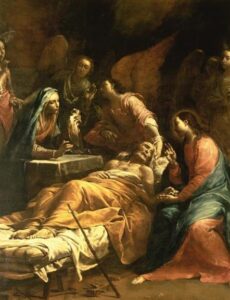
Two years ago, I experienced death face-to-face, after sitting bedside with my Dad for his last four days on earth. A man who had always been so strong; a great role model; knowledgeable on every topic; always ready to lend a hand – was now nearly helpless. He could not even take a drink of water without help. His time on earth was coming to an end and there was nothing the doctors could do about it, and there was nothing I could do about it.
The one thing I could do is to make sure that his priest Anointed him, gave him Viaticum, and prayed the Apostolic Pardon. After nearly 92 years, he had all the tools he needed for the journey: his good works, the Sacraments, and the Eucharist. He was ready. I wasn’t. I was still heartbroken. I wasn’t scared for him – not even a little. I know God has power over death and made us a promise of everlasting life. So, while I was beyond sad that I would no longer have my long talks with Dad, exchanging jokes, and getting the best advice a guy could want – I knew he would soon be in the presence of God.
My faith was confirmed when, in his final hours, while almost completely incoherent, he asked me who “all those people were” standing at the foot of his bed. He saw my Mom, who had died 8 years prior. He was talking to others, as if they were his old Navy buddies. It was like a homecoming. I was quite literally watching him “cross over” to his new life. Never before had I seen such concrete proof of life after death, and it brought me peace. Rest easy Dad, and please come to get me when it’s my turn.
Deacon Jim Stokes, J.D.
Diocese of Orlando
Proud HCC Parent
Image: Giuseppe Maria Crespi, ce 1712
Hail the Cross, our only hope. This is the way of Holy Cross College and it is also the way of the Saints. Christ sacrificed His entire life for you, for all peoples in all corners of the earth, past, present and future. When Christ was at Gethsemane, it is said that He saw all the sinners’ souls that He would be dying to save. It is also believed the angel revealed to Him all the souls who would one day offer sacrifices out of love for Him to console Him in His Passion. Here lies hope. In one instance, Christ’s Death and Resurrection brought all of us the chance for eternal life. Also, God’s ability to be outside of time allows us to be united to Christ so intimately in His Crucifixion. We become Simon of Cyrene. Suffering is an evil that God allows us to face so that we may be sanctified and purified through it. When we are stripped of our comforts as Christ was stripped bare on Calvary, our vulnerability gives us the opportunity to lean on Him for hope that the pain will be worth it. Suffering is useless on its own; however, when we ask the Lord to use it for His Will, we become partakers in Christ’s Salvific act. The spiritual life, unseen, is as real as the physically visible life we currently live in and because of this, asking God to use our pain can bring great joys to the souls in Purgatory and to sinners here on earth. No Saint drew near to Our Crucified Lord without suffering much. In our humility we can see that if God sent His only Son to suffer for our sake, we should accept suffering as a part of the human condition and as a way to deepen our union with the Lord. Hope is an act of the will, not a feeling, so even in times of desolation and sorrow, rest in the peace of Christ knowing that God allows suffering for His Children to purify them and lead them to His Heavenly Kingdom.
Alexandra Buchlmayer
Class of 2024
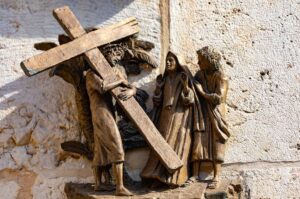
Where does empathy come from? I think it comes most easily when we have a shared experience. It doesn’t have to be the exact same experience, but when my experience connects with another’s experience through a kind of familiarity, my empathy is stronger and that empathy gives hope. It says we are not alone and provides a glimpse, a hope, that whatever this is, it is not all-consuming, and I can make it through even the tough stuff. My sense of suffering can make a connection with the suffering of another, and bring hope – probably for both of us.
At Holy Cross College we proclaim our discipleship. The Constitutions of the Congregation of Holy Cross tell us how our discipleship can bring hope: “…for Christ the Lord has risen to die no more…If we, like Him, encounter and accept suffering in our discipleship, we will move without awkwardness among others who suffer.” We thus become men and women, disciples, with hope to bring.
Ave Crux, Spes Unica
Brother Ken Haders, C.S.C.
Provincial
Congregation of Holy Cross
Midwest Province
Image: Via Dolorosa (Via Crucis) in Jerusalem (Notre Dame of Jerusalem Center)
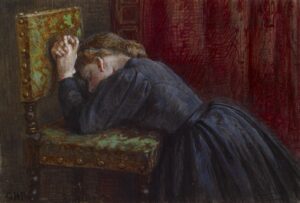
Back in 2002 when I was a southern Evangelical college student, I found myself in arguments with my well-intentioned friends about the nature of hope. I was going through struggles relating to an international family move that rendered me feeling strangely homeless and orphaned in my home country, and my friends worried that I was nearing the sin of despair. I remember these conversations as if they happened yesterday.
“The gospel calls us to a life of Christian hope,” they would remind me.
“I want to have that hope,” I would agree. “How do I find it?”
“You can find that hope in Jesus,” they would remind me. “He died and rose again so that we can have confidence in eternal life in heaven.”
“I believe that,” I would affirm. “I’m not struggling to believe in that future hope. I’m struggling to find a present hope, a hope that touches on what I’m going through now. Does the gospel only give us hope for what happens after we die, or does it give hope for right now as well?”
“Oh, the gospel definitely gives us hope for right now,” they would quickly affirm. I would urge them to elaborate. “Right now, we have hope…” they would seemingly hesitate, struggling for words, “that we can look forward to heaven after we die.”
I began to wonder if my questions even made sense.
They did. Those very questions about hope that I had as a college student had new meaning seven years later when I was metaphorically banging on the door to enter the Catholic Church in graduate school. The Eucharist testifies the reality not only that Christ is ascended to heaven in glory where we will join him one day, but that he is also still broken and bleeding in the flesh, here and now. Furthermore, his flesh is able to touch my very un-resurrected body concretely, my body that is definitely prone to be broken and to bleed, both physically and spiritually. The hope of the Cross is not only a hope of future resurrection, but also a hope that Christ meets me here and now in my present suffering.
Every year, Lent reminds me of the hope that drew me to the Catholic Church fourteen years ago. This season’s calling to repentance allows me to reflect on the places of sin, suffering, brokenness, decay, darkness, and death in my own life and to invite the broken and bleeding Christ to enter. It reminds me that he has entered the worst places of humanity, and that he still suffers with me. The hope that the suffering Christ touches my own flesh now, not only in the future resurrection, is truly a hope that is real.
Emily Ransom, Ph.D.
Image: George Henry Boughton, (ca 1860)
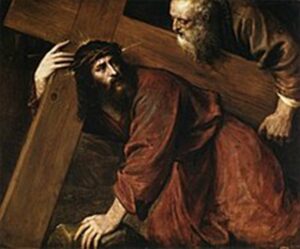
On August 7, 2022, I gave birth to my first son. The thirty-hour labor was strenuous and painful. Although I directed my suffering as an offering for a family member, the knowledge that this would eventually end kept me going.
What about those times in life when we don’t see an end in sight? An undiagnosed medical issue. Deep, all-encompassing grief. Stress and anxiety from school or work. The feeling of loneliness from heartbreak. I’ve had all these moments too. In these never-ending valleys, all I had was my faith, the cross, to cling to. Knowing that the cross, that rock of our faith, is unmoving, unbreakable, and unchanging centers me. Jesus wants us to lean on Him and know that we can give Him our suffering and that He will not break.
Even with this in mind, it can feel like our cross is too heavy to bear. In those moments, something I often reflect upon is a quote from the second station of Everyman’s Way of the Cross by Clarence Enzler. In this station where Jesus takes His Cross, man says to Christ, “Remind me often that in carrying my cross, I carry Yours with you. And though I bear a sliver only of Your cross, You carry all of mine, except a sliver, in return.”. By unifying our suffering with Christ, we can look beyond the mortal life we are living and see the eternal life for which we strive for. This thought reminds me that one day this life will end, and it gives me the hope I need to keep going forward.
Claire McNamara, M.Ed.
Office of Student Success
Image: Tiziano Vecelli, circa 1560
Let us face it. We are creatures of hope! We all hope for a good job and to have a good meal. But ultimately, what we truly hope for is that everlasting hope in which we can give love and receive love. We want authentic relationships, where we can tell someone that I cherish you, because I love you! We try to mean what we say. And yet, when we try to take about something truly human like the love that we have for each other, our lips become sealed. As a result, our identities are often too wrapped up in our performance reviews or crafting the perfect resume. We define our whole identity in light of our successes and failures. We lose hope of really discovering who we are and being capable of sharing that with others.
In eight months, I will make perpetual vows in the Congregation of Holy Cross. I will bind myself forever to the heart of Jesus Christ and declare that the Cross is our only hope. I would be lying if this did not fill me with some fear. After all, who wants to take up their Cross and walk the heavy burdens of life? And yet, nothing makes my heart more joyful. What does the Cross mean to me? It means that I get to tell everyone that there is a God who loves me no matter what. He loves me through all my trials, my failings, and my sins because he can give me what I really hope for: his heart. My life will not be about my resume, but it will be about living forever in the heart of Christ. That is not a bad way to spend a life, if you ask me!
Br. Bobby McFadden, CSC
Faculty
In the spring semester of my final year at Holy Cross, I was blessed with the opportunity to make pilgrimage to the Holy Land with a club I was involved with at Notre Dame. Most importantly, I was able to visit the site of the Crucifixion, housed in Church of the Holy Sepulchre alongside the Tomb of Christ in Jerusalem. Concluding our 5am Stations of the Cross at Golgotha, weaving through the alleys where our Savior trod, we then celebrated Mass in front of the empty Tomb.
When one looks at a map of the Old City of Jerusalem and where the Church of the Holy Sepulchre is situated, the chapel that memorializes Calvary faces to the East. If one were to remove the walls of the church complex and the urban developments since the first century, one would see both the Temple Mount and the Mount of Olives in the background of Christ’s Crucifixion. These two images are important, appearing throughout Scripture as motifs that remind the reader of the abiding presence of God in our lives.
The Temple Mount, an emblem of the Jewish people in biblical times, memorializes the relationship between God and humanity, and also serves as a symbol for the Garden of Eden; its reconstruction after the Babylonian exile illustrates that death and despair is never the final answer. In the Psalms, the Mount of Olives’ natural effect as a barrier is likened to God’s protection over His people, and the sunrise in Jerusalem always rises above the emerald hill.
When we look to the Cross, we look towards the imminent sunrise—the Resurrection.
When we consider the constant reminders of hope amidst our sorrow, we encounter God.
Ave Crux, Spes Unica!
Dane Litchfield, 2022
